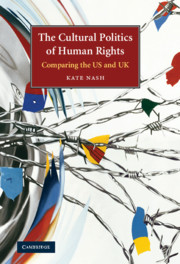Book contents
- Frontmatter
- Contents
- Preface
- List of acronyms used in the book
- Table of cases
- 1 What does it matter what human rights mean?
- 2 Analysing the intermestic human rights field
- 3 Sovereignty, pride and political life
- 4 Imagining a community without ‘enemies of all mankind’
- 5 Global solidarity: justice not charity
- 6 Conclusion
- References
- Index
3 - Sovereignty, pride and political life
Published online by Cambridge University Press: 27 June 2009
- Frontmatter
- Contents
- Preface
- List of acronyms used in the book
- Table of cases
- 1 What does it matter what human rights mean?
- 2 Analysing the intermestic human rights field
- 3 Sovereignty, pride and political life
- 4 Imagining a community without ‘enemies of all mankind’
- 5 Global solidarity: justice not charity
- 6 Conclusion
- References
- Index
Summary
Sovereignty is central to national state formation, and to the possibility of its transformation; it is, therefore, crucial to the realisation of human rights. As we noted in Chapter 1, the understanding of sovereignty as the freedom of a state from interference by other states is a significant dimension of the ideal of the self-determining national state. By the same token, the transformation of state sovereignty in international institutions of co-operative global governance is seen as necessary to address policy problems that increasingly arise in globalisation.
There is a popular view, shared by theorists of human rights and others, that human rights are, as a matter of fact, eroding state sovereignty. For example, David Forsythe has said that human rights law is ‘revolutionary because it contradicts the notion of national sovereignty – that is, that a state can do as it pleases in its own jurisdiction’ (quoted in Krasner 1999: 105). Similarly, David Hirsh says that ‘human rights are instruments that seek to limit the scope of state sovereignty’ (quoted in Sznaider and Levy 2006: 659). Alternatively, it is argued that because sovereignty is not ‘indivisible, illimitable, exclusive and perpetual’ (Held, quoted in Bickerton et al. 2007: 5), but rather socially constructed, historically specific and mutable (see Biersteker and Weber 1996), it is better understood as transformed by human rights.
- Type
- Chapter
- Information
- The Cultural Politics of Human RightsComparing the US and UK, pp. 71 - 104Publisher: Cambridge University PressPrint publication year: 2009



